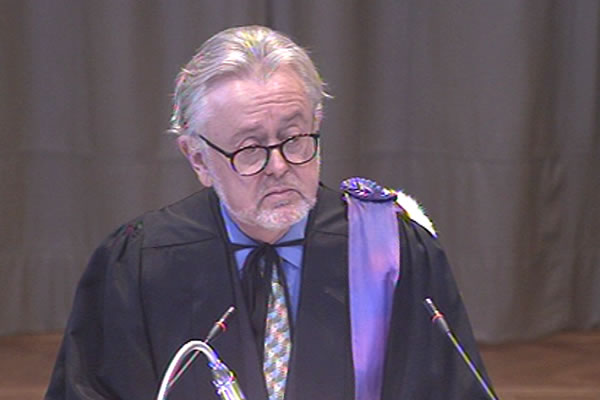Home
SERBIA: CRIME OF ALL CRIMES WAS NOT COMMITTED
While Serbia’s representatives accept that the crimes were committed in Croatia, they deny that murders and grave psychological and physical injuries were inflicted with the intent to ‘destroy in part or as a whole the Croatian population’ in the areas Serbs claimed belonged to them
 William Schabas, member of Serbian legal team
William Schabas, member of Serbian legal team In response to the accusations from Zagreb that during the war Serbia committed a series of crimes with the intent to ‘destroy in part or as a whole’ the Croatian population in the territories Serbs claimed belonged to them, Canadian professor William Schabas agreed that crimes had been perpetrated in Croatia. However, as Professor Schabas emphasized, they were not committed with ‘genocidal intent’.
In Schabas’s opinion, Croatia ‘failed to prove that there was a plan’ put in place by Serbia or the Republic of Serbian Krajina to ‘commit genocide’. Efforts to prove the existence of a ‘genocidal intent’ using statements of ‘fringe politicians’ such as Milan Paroski or Vojislav Seselj was, in Schabas’s words, ‘pathetic’. Hate speech and derogatory language that had accompanied the crimes was nothing but ‘soldiers’ talk, typical for armed conflicts’ and no weight should be given that, said Schabas.
On the other hand, Schabas claimed that the statements made by Croatian president Franjo Tudjman were evidence of his genocidal intent. At the meeting with the Croatian military leadership on Brioni on 31 July 2014 Tudjman said that the army should ‘inflict such blows that the Serbs will, to all practical purposes, disappear’. Serbia quoted Tudjman’s statement in its counter-suit in which it alleged Croatia committed genocide against Serbs in Operation Storm in the summer of 1995.
In the arguments presented last week Croatia urged the judges not to attach too much importance to the decision of the chief prosecutor at the Tribunal for the former Yugoslavia not to indict anyone for genocide in Croatia. Schabas, on the contrary, claimed that the indictments were not issued at the ICTY because there was no evidence of genocide. ‘It is impossible that the prosecutor decided not to issue any indictments only because of the cost involved or because of the length of the potential trial’, Schabas said, asking ‘what kind of killer evidence, not available to the Tribunal's chief prosecutor, can Croatia possibly have?'
Schabas noted that in the Tribunal’s judgments in the cases against Milan Martic and the Vukovar Three, which were based on the evidence of hundreds of witnesses and thousands of exhibits, the judges found that war crimes and crimes against humanity had been committed, but they did not find the evidence of the ‘crime of all crimes’.
At the end of his presentation Schabas said that Serbia couldn’t be responsible for the violations of the Genocide Convention for failing to punish those who committed crimes. If Serbia is to be held accountable for failing to investigate crimes and punish those who committed genocide, could the Tribunal’s chief prosecutor be charged with the same failure, Schabas asked.
The Canadian professor urged the judges to rely on the judgment in the Bosnia and Herzegovina vs. Serbia case, where the ICJ found that genocide had not been committed in Sarajevo and Prijedor although the crimes there were larger in scale than those in Vukovar. In Schabas’s view, the same logic should be applied in the Croatia vs. Serbia case.
After Schabas completed his presentation, Novak Lukic and Dusan Ignjatovic, lawyers from Belgrade, explained why the crimes committed by the JNA, the volunteer and paramilitary formations, the Territorial Defense, the Krajina police and other Serbian forces couldn’t be attributed to Serbia. They argued that the JNA was neither de jure nor de facto a Serbian body and noted that the Serb forces in Croatia didn’t operate under the JNA command.
Linked Reports
- Case : Croatia vs. Serbia
- 2014-03-11 CAN GENOCIDE CONVENTION APPLY TO WORLD WAR I?
- 2014-03-10 SERBIA: GENOCIDE AGAINST SERBS, NOT CROATS
- 2014-03-07 IS THERE EVIDENCE OF SERBIA’S ‘GENOCIDAL INTENT’?
- 2014-03-13 ‘KRAJINA SERBS NO LONGER EXIST AS A GROUP’
- 2014-03-14 ‘GENOCIDE WAS THE ONLY SOLUTION FOR KRAJINA SERB PROBLEM’
- 2014-03-18 CROATIA DISMISSES COMPARISONS BETWEEN BRIONI AND WANNSEE
